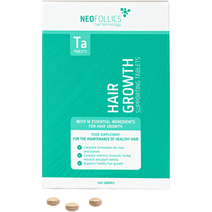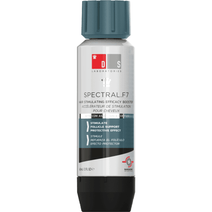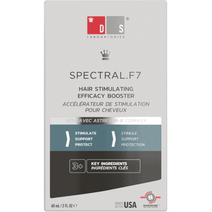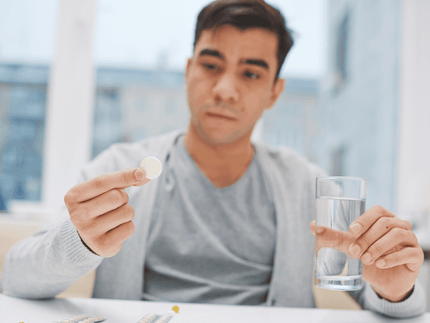What causes hair loss through weight loss?
Not everyone who loses weight has to suffer from hair loss. In most cases, hair loss is caused by a shortage of nutrients that you take in through dieting. The main nutrients responsible for this are proteins. If you want to lose a lot of weight quickly, you often eat a lot less than before, which means your body probably does not get enough protein.
Hair loss through a crash diet
With a crash diet, the goal is to lose as many kilos as possible in a short period of time. To achieve this, you probably eat too little or with too little variation during this period. This form of dieting, where you lose a lot of weight in a short amount of time and don't consume much protein, may lead to telogen effluvium. Telogen effluvium is a sudden loss of hair distributed over the entire scalp. Telogen effluvium can be caused by stress, illness, medicine and hormone fluctuations, but also by weight loss (Source: the study 'Telogen effluvium: a comprehensive review'). A large number of hairs enter the resting phase simultaneously, causing a lot of hair to fall out. The hair becomes thinner, but bald patches do not really appear. Hair loss can occur suddenly and be so severe that it becomes noticeably thinner in a short time, but it can also start more slowly and last longer. Read more about the causes of hair loss.
Advice personalized to your hair needs
Take our Hairtest to find the best products for your hair within 2 minutes!
Hair loss because of an eating disorder
Having an eating disorder can also cause hair loss in the form of telogen effluvium.
If you suffer from anorexia, you may notice that your hair becomes very thin and brittle at first. This is due to a lack of moisture. When your body starts to notice that it is not getting enough nutrients, it can start losing more and more hair. If you suffer from bulimia, your food and drink expelled from the body so quickly that your body does not have the chance to absorb the nutrients. This can also cause your hair to become thinner and more brittle, and then you may experience hair loss.
Remember that your body is trying to send out a signal that it has a shortage through hair loss. If you recognise yourself in this, see it as a sign. Give your body the necessary fluids and nutrients. When recovering from an eating disorder, give yourself the chance to regain your former hair!
Hair loss through intermittent fasting
Intermittent fasting is a well-known form of fasting. It means that you can only eat within a certain number of hours. Unfortunately, many people unconsciously eat less during these hours. If you know that your calorie intake is much lower than your body needs, or that you are starting to eat a less varied diet, pay attention. This could mean that your body is not getting enough nutrients. A lack of nutrients can cause you to suffer from hair loss in the form of telogen effluvium.
Besides intermittent fasting, other forms of fasting can also cause hair loss. An example of this is fasting during Ramadan. Here too, you have fixed times when you are allowed to eat, so you risk eating too little or less varied.
How can I prevent hair loss when I lose weight?
- Try to lose weight more gradually. It is recommended to lose a maximum of 1 kg per week so that your body does not go into shock. In this way, you reduce the chance of stress hormones in your hair follicles, which reduces the risk of telogen effluvium.
- Watch your protein intake. If you find it difficult to determine whether you are getting enough nutrients, you can use a diet app to track your diet. This app will then indicate how many nutrients you need.
- Use vitamin supplements to prevent any deficiencies.
Hair loss due to weight loss should decrease after 3 to 6 months. Should you still be suffering from hair loss after this period, we recommend you to visit a doctor or a dermatologist. He or she can then check for you whether weight loss is the only cause of your hair loss, or whether there is another explanation for your hair loss.
Products that can stimulate hair growth after losing weight
Neofollics tablets. These tablets contain a wide range of amino acids, minerals and vitamins essential for healthy hair growth. They include three important amino acids; L-carnitine, L-cysteine and Taurine. These improve hair growth by improving the transport of nutrients to the hair root and increasing energy production.
Spectral.F7 contains Astressin-B and copper peptides, among others. Astressin-B is a peptide complex of 33 amino acids that reduces stress hormones, prevents hair loss and stimulates new hair growth, increases the hair shaft's diameter, and stimulates keratin production. This makes it an effective lotion against non-hereditary hair loss.
Revita.SOD These nutritional supplements stop hair loss, promote hair growth and keep hair healthy. The formula has been specially developed for hair loss due to stress and based on the latest developments in the treatment of alopecia. Thanks to the right nutrients and antioxidants, the supplements act on all factors related to alopecia: oxidative, inflammatory and hormonal.

.png)













